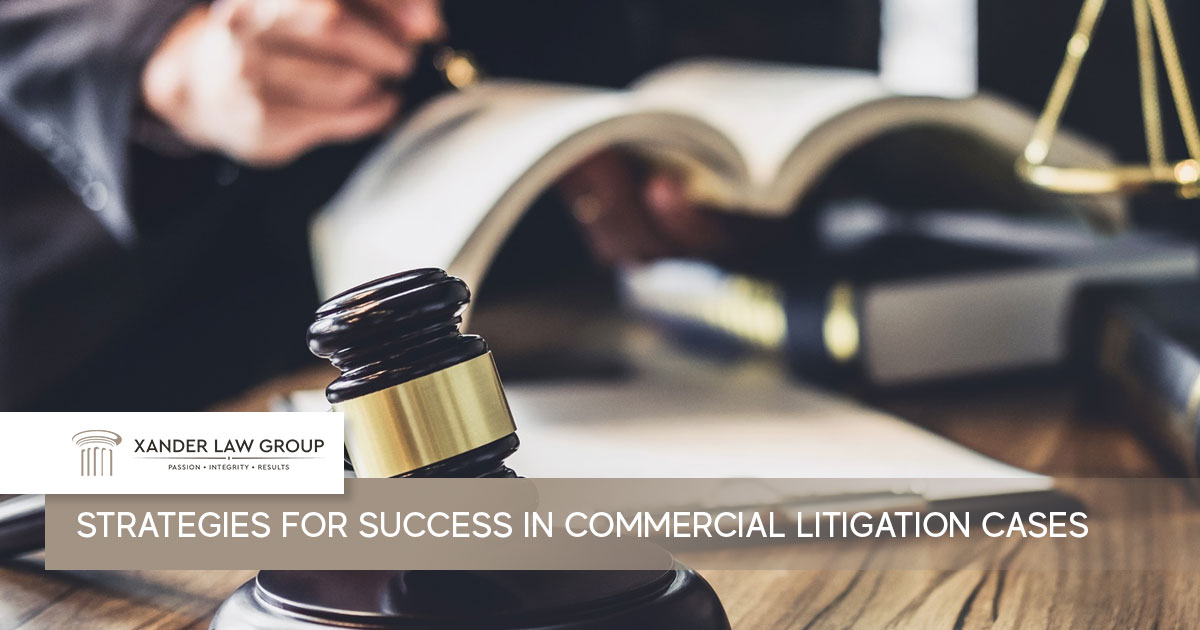Strategies For Success In Commercial Litigation Cases
Behind every winning commercial litigation case is a carefully considered, expertly implemented legal strategy. Commercial litigation attorneys know that a good litigation strategy can materially shape case outcomes. Whether the aim is to limit civil liability, negotiate a favorable settlement, or recover the maximum civil damages available in the circumstances; a lot is relying on a litigation lawyer’s ability to assess and appropriately respond to the risks, and capitalize on the opportunities, that litigation presents.
In this article, we draw on our years of litigation experience to provide insight into the key elements of a litigation strategy.
Know What – And Who – You Are Working With
Attorneys must have a comprehensive grasp of the facts of their commercial litigation case and an understanding of their client’s business. The only way to limit the hidden risks of litigation is to ensure that clients have been honest in their disclosures of the facts. Cultivating a relationship with clients that is based on honesty, trust, and open communication is key: clients need to understand that keeping compromising information or records to themselves will only jeopardize their case further and may have serious ramifications down the line. Only once both attorney and client are on the same page as to the facts – and the vulnerabilities or advantages that they present – can effective legal strategizing begin.
Commercial litigation attorneys must not only have reliable insight into who their clients are, the nature of their business dealings, and whether they can be trusted to disclose all relevant information: but they must also develop an understanding of who they are up against. With some knowledge of the opposing party’s business, personas, and key priorities, preempting their litigation strategy will be easier.
It is helpful, too, for attorneys to be familiar with the opposing parties’ representatives: how they have handled complex commercial litigation in the past, whether they take a more collegial or combative approach, and how they are likely to approach settlement discussions, are all important considerations.

Map All Possible Outcomes
Developing an effective and robust legal strategy requires predicting various possible outcomes (at every stage of the proceedings) and planning an effective response to each. This means that attorneys need to identify, early in case preparations, all possible claims their clients could bring, all possible counterclaims their opponent could raise, and all defenses available to their opponent (or their client, as the case may be).
Outcomes are also shaped by the evidence produced to substantiate claims. Commercial litigation attorneys must be realistic about the evidence they collate and the grounds on which it is likely to be challenged. Planning for a variety of potential scenarios allows legal teams to be one step ahead of their opponents and makes the course of commercial litigation easier to control.

Strategic Use Of Discovery
Discovery – the process by which plaintiffs and defendants request records, documents, recordings, and other relevant evidence from one another – is a critical stage in any legal proceedings. In terms of the Florida Rules of Civil Procedure, parties to litigation may request from one another any information (other than privileged information) that is relevant to the subject matter of the legal action.
The strategic leveraging of the discovery process is key to any successful commercial litigation strategy. Attorneys should have undertaken an in-depth analysis of their opponent’s claims, counterclaims, or defenses to best position themselves to make comprehensive, yet specific, information requests.
A catch-all approach to discovery is never advisable: by making targeted, detailed requests, attorneys can force the hand of their opponents while reducing the risk that they will be overwhelmed with hundreds of irrelevant documents.
It is also important to be strategic when responding to discovery requests. Of course, a commercial litigation attorney’s priority should be to flag all privileged information and ensure that it is not disclosed. It takes years of experience to develop an intuitive understanding of when to object to a discovery request on grounds of relevance or privilege; and when to submit a compliant and complete response.
Sometimes, making tactical admissions can pave the way for a mutually beneficial settlement for all parties. Sensing when to push back – and when to play ball – can make all the difference in steering the direction of a case toward a client’s desired outcome.

Prepare Meticulously
Meticulous, thorough preparation is central to any winning litigation strategy. This applies to the filings commercial litigation attorneys must draft, the evidence they must collate, the witnesses they must prepare, and the legal argument they must present.
A deep, up-to-date knowledge of the applicable legal principles, a firm grasp of even the smallest factual details of the case, and a persuasive, engaging, well-prepared legal argument, are a must for all trial lawyers who hope to successfully represent their clients.
Diligent preparation also requires strong organizational skills and exemplary time management. In civil litigation, strict, stressful timelines are unavoidable. The key to coping with significant time constraints is early preparation, careful planning, and appropriate task allocation and resource management. Those who aim to complete their filings and evidence-gathering ahead of court-mandated timelines are usually in a much better position when it comes to last-minute hurdles and changes.
Winners Know When To Settle
As any successful commercial litigation attorney will know, over 90% of lawsuits are settled before they reach the trial stage. The first step to reaching a favorable settlement is, unsurprisingly, to put clients in a strong bargaining position before any negotiations begin, by presenting the best possible case early in the proceedings.
Part of a successful negotiation strategy is assessing when a client is in this strong position; that is when the ideal moment to initiate negotiation has arisen. Being the first party to suggest negotiation in commercial litigation cases has its pros and cons, and timing is everything: much will depend on the nature of the individual case and the relative strength of the parties’ bargaining positions.
Successful negotiators negotiate from the strengths of their case and not its weaknesses, but they know when to be accommodating and responsive to circumstances as they shift. Most importantly, they know when to stop pushing back and when to accept an offer: overplaying your hand from what was once a strong position can be a critical negotiation error. Finally, the best negotiators keep their egos out of the negotiation room and focus on securing the best agreement for their client.

Hiring Reputable Commercial Litigation Attorneys Is The First Step To Success
At the helm of every successful commercial litigation strategy is a highly qualified, diligent, and reputable lawyer. At Xander Law Group, we have years of experience in successfully representing commercial clients from a range of sectors in commercial litigation proceedings.
Our reputation for passionately representing our client’s interests and crafting winning legal strategies makes us one of Miami’s stand-out litigation firms.
For peace of mind that your business will receive only the best legal representation, give us a call today at 1-305-767-2001.









